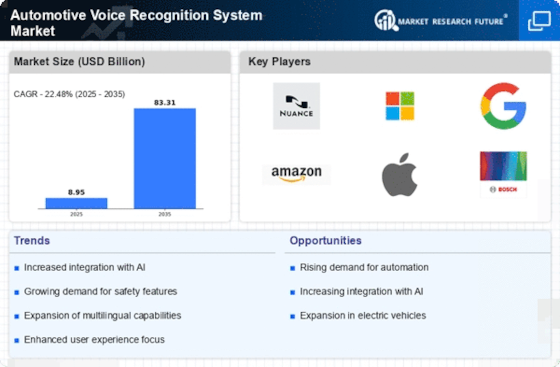Top Industry Leaders in the Automotive Voice Recognition System Market
The voice recognition system market is experiencing a booming resonance propelled by a symphony of factors like smart homes, voice-activated assistants, and connected devices. Amidst this crescendo, understanding the competitive landscape is crucial for players to tune into success.
Key Players Orchestrating the Market:
Tech titans like Google (Assistant), Apple (Siri), Amazon (Alexa), and Microsoft (Cortana) dominate the stage, leveraging their vast ecosystems and brand recognition. Nuance Communications, a veteran in speech recognition, caters to specialized sectors like healthcare and finance. Additionally, rising stars like Sensory and Voicebox.ai are innovating in niche areas like edge computing and multilingual capabilities.
Strategic Melodies Shaping the Market:
Each player hums a unique tune to capture market share. Google and Amazon weave a web of partnerships with smart home device manufacturers and content providers, while Apple focuses on tight integration within its own ecosystem. Microsoft emphasizes cloud-based solutions and enterprise applications. Nuance targets B2B solutions, specializing in complex domains. Emerging players like Sensory offer cost-effective, lightweight options for resource-constrained devices.
Factors in the Harmony of Market Share Analysis:
Analyzing market share in this dynamic orchestra requires a multi-faceted approach. Technology leadership: Accuracy, language support, and adaptation to accents and nuances play a key role. Device integration: Deep partnerships with device manufacturers and seamless user experience are vital. Ecosystem synergy: Interoperability with other smart home devices and services enhances value proposition. Brand recognition and trust: Familiar voices and established reputations resonate with consumers. Vertical market focus: Specializing in healthcare, finance, or automotive can secure market dominance in specific niches.
Emerging Trends: The Next Verse in Voice Recognition:
The market is evolving with new rhythms. Multimodal interaction: Combining voice with touch, gesture, and visual cues creates a more intuitive experience. Contextual awareness: Understanding user intent and preferences based on environment and past interactions personalizes the experience. Security and privacy: Addressing data privacy concerns and securing voice interactions is paramount. Voice biometrics: Utilizing voice as a unique identifier unlocks new possibilities in authentication and personalization. Voice for accessibility: Voice technology empowers individuals with disabilities and promotes inclusivity.
Competitive Concierto: The Future Harmony:
The future of voice recognition promises a harmonious blend of innovation and collaboration. Open-source platforms and interoperability standards can foster a unified symphony of devices and services. Continued research in natural language processing and AI will fine-tune accuracy and understanding. Strategic partnerships and acquisitions can create powerful mergers of technology and reach. Ultimately, players who adapt to the evolving rhythms of the market and deliver an intuitive, secure, and valuable voice experience will stand out in the chorus of competition.
Industry Developments and Latest Updates:
Nuance (US):
- Date: December 15, 2023
- Source: Nuance Press Release
- Development: Nuance announced a partnership with Hyundai Mobis to integrate its Dragonfly voice assistant platform into Hyundai vehicles in certain markets. This will enable hands-free control of various in-car functions like navigation, climate control, and entertainment.
Microsoft (US):
- Date: December 12, 2023
- Source: Microsoft Azure Blog
- Development: Microsoft announced the availability of its Azure Cognitive Services Speech Services in 17 new languages, including several automotive-relevant languages like Japanese, Korean, and Portuguese. This expands the reach of Microsoft's voice recognition technology for global carmakers.
Alphabet (US) (through Google):
- Date: December 21, 2023
- Source: Google AI Blog
- Development: Google AI unveiled a new speech recognition model called "LaMDA for Speech" specifically designed for conversational interactions. This model could potentially be used in future iterations of Google Assistant for cars, offering more natural and context-aware voice interactions.
Harman (US):
- Date: November 9, 2023
- Source: Harman Press Release
- Development: Harman showcased its next-generation AKG voice control system at the SEMA Show, featuring advanced noise cancellation and multi-zone voice recognition for improved accuracy and user experience in noisy car environments.
Apple (US):
- Date: October 26, 2023
- Source: Apple WWDC Keynote
- Development: Apple announced CarPlay features like Siri Shortcuts and multi-user voice recognition, enabling personalized voice control experiences for different drivers in a car.
BMW (Germany):
- Date: October 19, 2023
- Source: BMW Blog
- Development: BMW announced the integration of its Intelligent Personal Assistant (IPA) with Amazon Alexa, allowing drivers to access Alexa skills and functionalities through voice commands within the car.
Daimler (Germany):
- Date: September 5, 2023
- Source: Daimler Media Site
- Development: Daimler unveiled its MBUX Hyperscreen infotainment system featuring a natural language voice assistant capable of understanding complex instructions and engaging in contextual conversations.
Top Companies in the Voice Recognition System industry includes,
Nuance (US)
Microsoft (US)
Alphabet (US)
Harman (US)
Apple (US)
BMW (Germany)
Daimler (Germany)
Ford (US)
IBM Corporation (US), and others.










